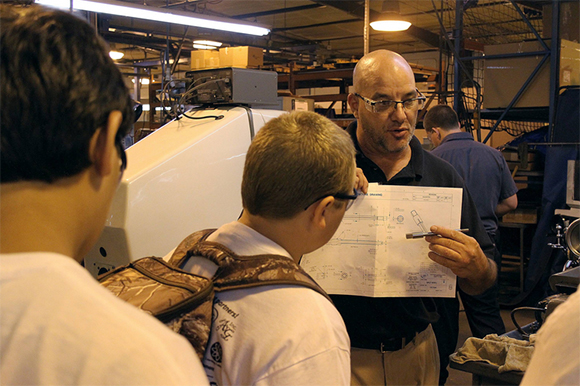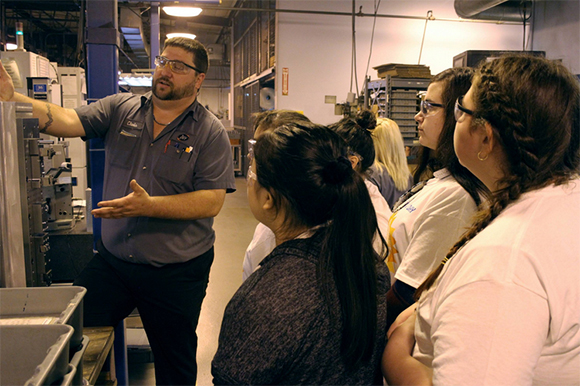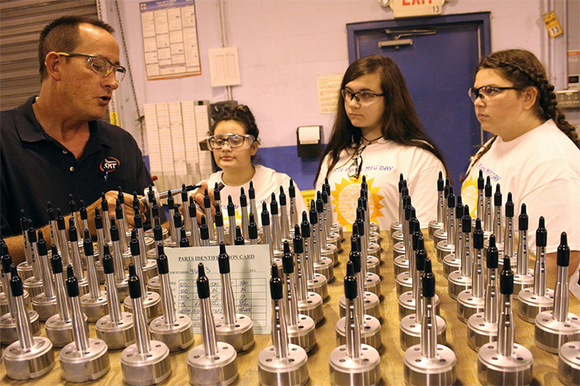Preparing for the future: Schools gear up to train students for new manufacturing jobs
Local schools are re-emphasizing training for skilled labor jobs to meet the demands of a rebounding manufacturing industry. More than 4,000 jobs are now available in the Tampa Bay region.
There was a time when “shop” classes were as much a part of the school curriculum as math, science and English, especially for boys. Shop was where students learned to use tools — and their hands — to build everything from wooden furniture to electric lamps.
The class was an introduction to skilled trades that made schools a pipeline of ready-made employees for manufacturing recruiters.
That pipeline, however, slowed to a trickle in recent years as most schools deemphasized skilled trades, phased out shop classes and opted instead to promote college as the preferred destination for all graduating high school seniors.
“That trend has certainly happened nationwide,” says Dr. Nancee Sorenson, president of the Hillsborough Community College’s Brandon campus. “I’ve seen it in other states where they’ve kind of moved the vocational, technical types of things into magnet schools or specialized areas, rather than having it be a regular part of the curriculum that was required.
“I think the pendulum swung in a negative way in terms of spending on technical education,” she says. “Nationwide, you can see it hurt students when it started to be moved out of school, and now states are working hard to get that funding and refocus back in those areas. In Florida it’s a little bit different because that’s one of the things that educationally our Legislature and the governor do support.”
And with good reason. Rebounding from a recession that cut deeply into the area’s workforce, the Tampa Bay area is now beginning a new building boom, with billions of dollars earmarked for a multitude of business and residential projects — some of which are already underway and all of which will result in a surge of new manufacturing jobs.
The problem? Skilled laborers left Florida in droves during the recession and Baby Boomers are retiring at a rapid pace. Finding enough people to replace them and fill all the new positions is a growing statewide challenge.
Says Sorenson: “In the Tampa Bay area, openings in manufacturing are 4,000-plus, with the majority of those jobs requiring post-secondary training (certifications through the Associate Degree).”
College isn’t the answer for everyone
Cassandra Parker, a junior at Middleton High School, is one of those students who is taking the magnet school route in her pursuit of an engineering degree — an ambition that began when, as an imaginative young girl, she exhibited the kind of manufacturing prowess that would have made Henry Ford proud.
“I would set up assembly lines, and I was the only worker,” she says. “I would go into different stations with my Legos and make different things and mass-produce them. I’d make like a little, tiny house, and I’d make like 20 of them.”
Cassandra is one of 684 students enrolled in Middleton’s highly acclaimed STEM (Science, Technology, Engineering and Math) program, most of whom will likely go on to college. But as Middleton Engineering Instructor Susan Gerena notes, not all students are “the scholarly type.”
“They’re good with their hands,” she says, “and they’re good (with) practical (application), but they’re just not for report-writing and private management and things like that. But they have a good eye.”
Gerena, a former engineer who is now in her fourth year teaching at Middleton, advises those students that “there are numerous options for you, and college may not be the right one, nor should it have to be. But you should be making some choice that doesn’t just send you to retail or food service.”
“They should not just leave here and be like, ‘Eh, what do I do?’,” she says.
What do they do, indeed.
The Hillsborough school district has softened its language regarding college and now says it wants graduating seniors to be college-ready or career-ready, but Gerena says the schools “are still hard-talking about college.” It’s an issue which, in part, is influenced by parents who went to college and expect their children to do the same.
As Sorenson puts it: “The baccalaureate degree is oversold” as illustrated by the number of college graduates unable to find jobs.
“Where we’re really lacking is a qualified technical workforce — and then one can always move up from there,” she says. “You start with a certificate and an associate degree, get yourself a great paying job, and then if you want to move forward with a baccalaureate degree for what you’re doing, many employers are willing to pay for that.”
For many contemplating their career path, money can be the deciding factor.
Apprenticeships, on-the-job training available
Shannon Sweatman, the HR director at Southern Manufacturing Technologies (SMT), poses a standard question for each of the hundreds of middle and high school students who visit her father’s Tampa plant each year.
“What percentage of jobs here in our company,” she asks, “do you think we require a college degree for?”
And the answer?
“The answer is zero,” she says, “but they all think it’s 100 percent.”
“I thought I would need a college education,” admitts Robert Hagerty, a seventh-grader at Plant City’s Marshall Middle School, during a tour of the SMT facility.
Classmate Lauren Monteagudo concurred: “I was surprised because it seems like it’s a lot to do and it’s really high-tech.”
And although manufacturing is high-tech and often requires advanced training — Tampa-based SMT, for example, produces high precision components for aircraft, aerospace and defense industries — it doesn’t necessarily require a four-year or more college education.
“They don’t understand that most manufacturing jobs do on-the-job training,” says Sweatman. “Many have apprenticeship programs that are available, which we do, so you work full-time and go to school and you are making better money here than if you go to college and you work at a restaurant part-time. You’re likely making more here than if you worked at McDonalds. And then they don’t have the (college) debt on top of it.”
That opportunity to develop a trade skill and get a well-paying, full-time job straight out of high school or after two years of training after completing a certified training program at a community college — and without the burden of exceptional college debt — can be an attractive combination for a graduating senior. HCC, for instance, offers short-term and degree program options in the advanced manufacturing arena.
Gerena notes that apprenticeships are “an old-school way of doing things,” and that although the idea is starting to get revitalized, more companies need to embrace the concept. Given the current demand for skilled labor, that could happen. To date, however, supply is falling woefully short of demand.
As HCC’s Sorenson attests, “In some of our programs, including apprenticeships, employers cannot keep up with the demand for new employees.”
According to Sweatman, the benefit of apprenticeships to both the employer and the potential employee simply can’t be undervalued.
“Honestly,” she says, “I’d rather hire somebody with experience than a degree. I tell all the students, while you’re in high school and/or while you’re in college, whatever you do, get a part-time job in the field of whatever you think you want to do because you’re going to be much more marketable compared to any other student who just got their degree. I don’t care if they have better grades. … I would take somebody with a slightly lower GPA that has actual work experience over somebody that only has the theory.”
Sorenson adds that someone’s career decision isn’t necessarily determined by whether someone is “cut out” for a college education.
“I think it’s about finding what your interests are and finding where you excel,” says Sorenson, who uses her position at HCC to help create high-paying jobs. “There are lots and lots of intelligent people out in the workforce graduating from high school. So I think it’s about that career education piece. We want to create more high-paying jobs in our area.
“And that’s another thing, too,” she says. “People go into enormous (college) debt, whereas you have lots of employers that are willing to help people complete degrees. So going to work makes a lot of sense.”
For more information about training and jobs, visit the Manufacturing Alliance of Hillsborough County.
















